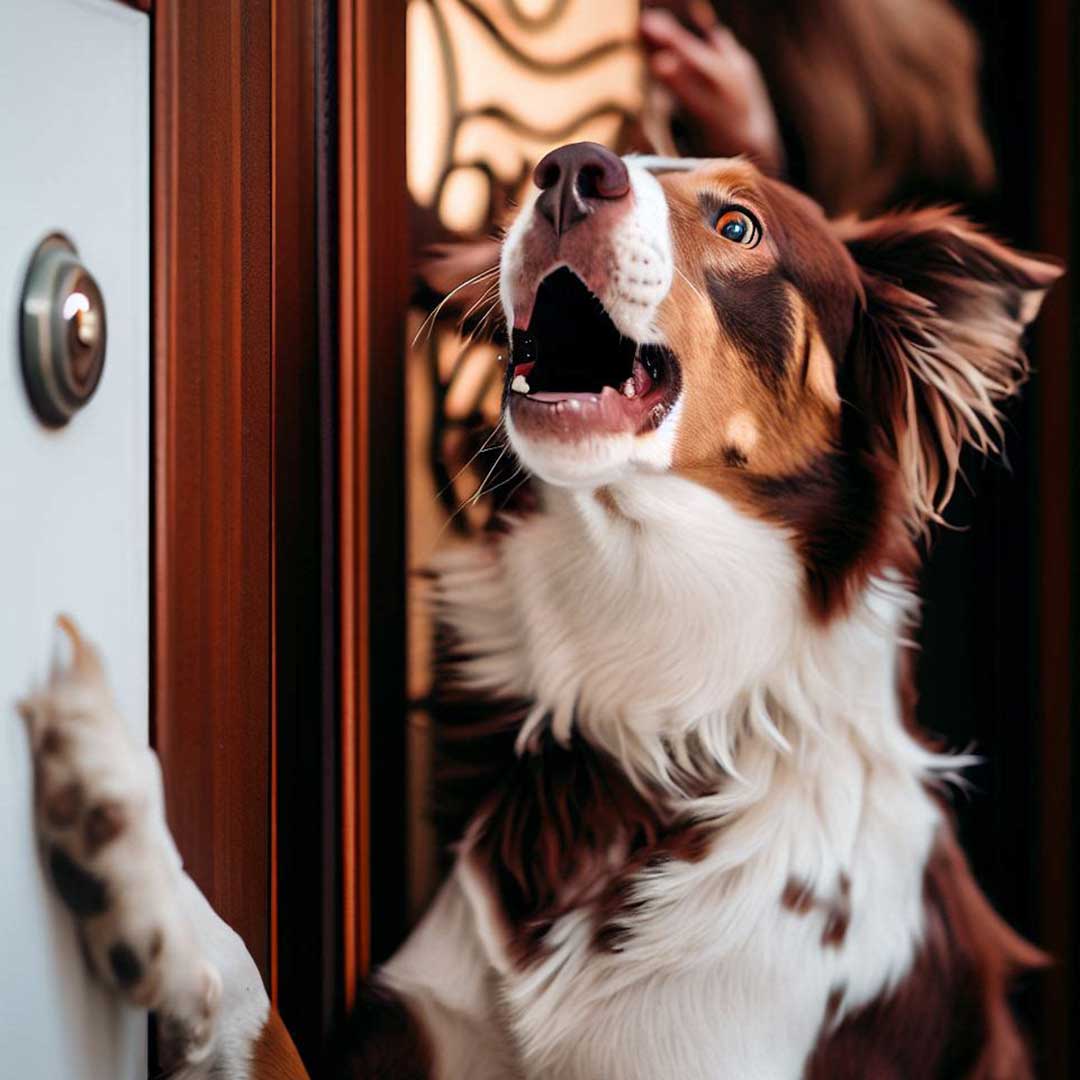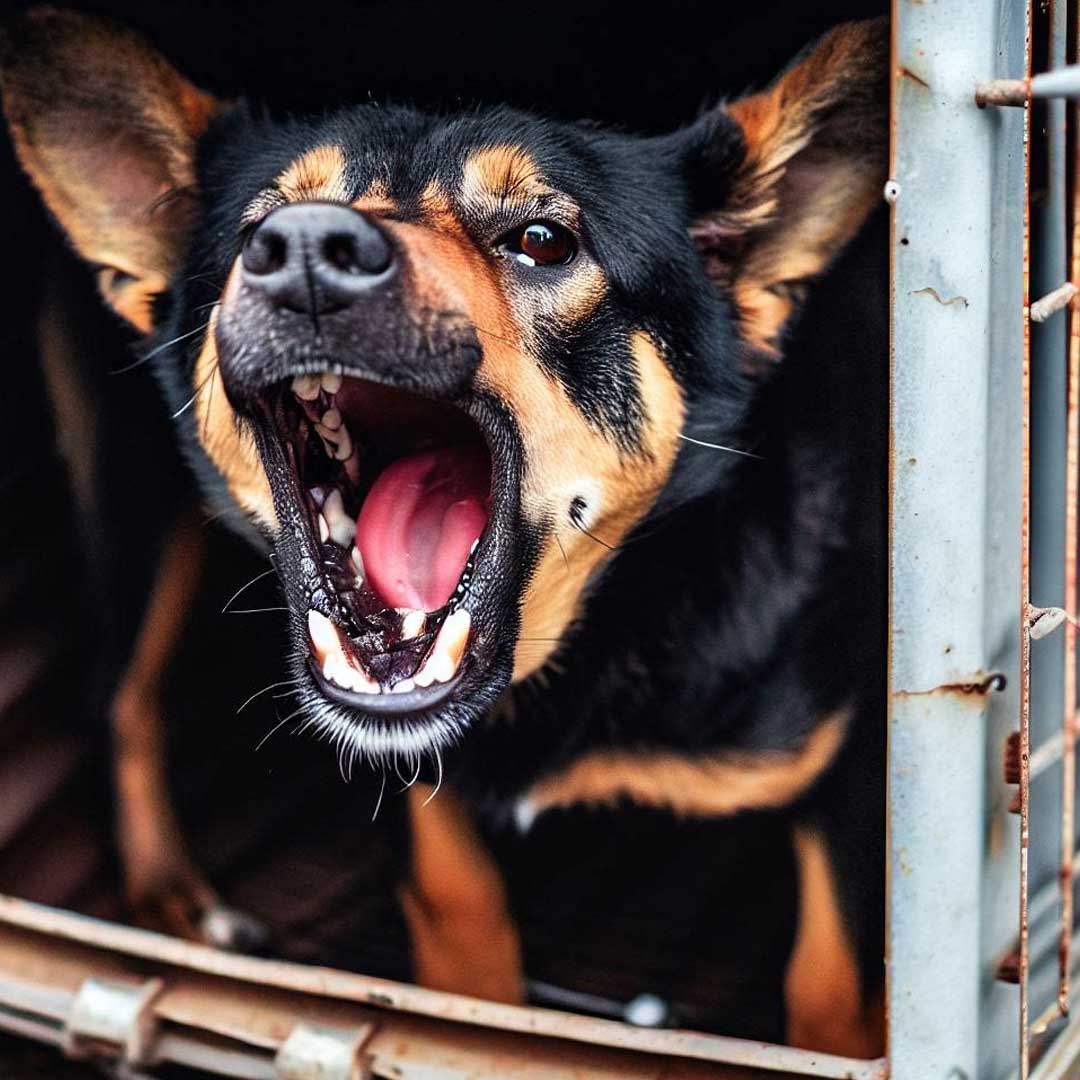If you have a dog that barks nonstop, you might wonder if they ever get tired of barking. Surely, all that noise must exhaust their vocal cords and energy, right?
Well, the answer is not so simple. Dogs bark for many reasons, and some of them can be quite persistent and loud. Barking is a natural way for dogs to communicate, but it can also be annoying and disruptive for you and your neighbors.
In this article, you will learn why dogs bark excessively, how to deal with it, and whether they ever get tired of barking. Plus, you will discover 12 surprising facts and tips about dog barking that will help you understand your furry friend better.
Table of Contents
Why Do Dogs Bark Excessively?

Dogs bark for many reasons, but they are all related to expressing their emotions, needs, or instincts. Some of the most common causes of excessive barking are:
- Boredom. Dogs that are left alone for long periods or don’t get enough mental and physical stimulation may bark out of boredom. They may also develop other destructive habits, such as chewing or digging.
- Separation anxiety. Dogs that are very attached to their owners may bark excessively when they are separated from them. They may also show signs of distress, such as panting, drooling, pacing, or whining.

Separation anxiety can cause excessive barking in dogs - Attention-seeking. Dogs that crave attention from their owners or other people may bark to get it. They may also bark to ask for food, toys, or playtime.
- Territoriality. Dogs that are protective of their home, family, or belongings may bark at anyone or anything that approaches their territory. They may also bark to warn off potential threats or intruders.
- Fear. Dogs that are afraid of something, such as loud noises, strangers, or other animals, may bark to express their fear or to try to scare away the source of their fear.

Wildlife can trigger your dog’s barking instinct - Excitement. Dogs that are excited about something, such as seeing their owner, going for a walk, or playing with a friend, may bark to show their enthusiasm or joy.
- Frustration. Dogs that are frustrated by something, such as being confined, restrained, or ignored, may bark to vent their frustration or to try to change the situation.
- Pain or illness. Dogs that are in pain or suffering from a medical condition may bark to indicate their discomfort or to seek help.
As you can see, dogs bark for various reasons, and some of them are more difficult to control than others. However, understanding why your dog barks excessively can help you find the best solution to reduce it.
Do Dogs Get Tired of Barking?

You might think that dogs would get tired of barking after a while, but the truth is that they can keep barking for a long time, depending on several factors. Some of these factors are:
- Breed. Some dog breeds are more prone to barking than others, due to their genetic traits, temperament, or purpose. For example, hounds, terriers, and herding dogs tend to bark more than other breeds, because they were bred to hunt, chase, or work with livestock.
- Personality. Some dogs are more vocal than others, due to their individual personality, mood, or preferences. For example, some dogs may bark more when they are happy, while others may bark more when they are angry.
- Training. Some dogs are trained to bark for specific reasons, such as alerting, guarding, or performing. For example, some dogs may bark on command, while others may bark to signal danger or to deter intruders.
- Environment. Some dogs are influenced by their surroundings, such as the noise level, the presence of other animals, or the availability of stimuli. For example, some dogs may bark more in urban areas, where there are more sounds and sights, while others may bark more in rural areas, where there are more scents and trails.
- Health. Some dogs may bark more or less due to their physical condition, such as their age, weight, or energy level. For example, some dogs may bark more when they are young, energetic, or overweight, while others may bark less when they are old, tired, or sick.
As you can see, dogs have different barking stamina, depending on various factors. However, even the most persistent barkers can get tired of barking eventually, especially if they are not rewarded or reinforced for their barking behavior.
How to Stop Your Dog from Barking Too Much

If your dog barks excessively, you might be tempted to yell at them, scold them, or even use physical punishment to make them stop. However, these methods are not only ineffective, but also harmful, as they can make your dog more anxious, fearful, or aggressive.
The best way to stop your dog from barking too much is to use positive reinforcement, which means rewarding your dog for good behavior and ignoring or redirecting bad behavior.
Here are some steps you can follow to use positive reinforcement to reduce your dog’s barking:
- Identify the cause of your dog’s barking. The first step is to figure out why your dog barks excessively, as this will help you choose the best solution. For example, if your dog barks out of boredom, you can provide them with more exercise and mental stimulation. If your dog barks out of fear, you can expose them to the source of their fear gradually and positively.
- Teach your dog the “quiet” command. The second step is to teach your dog to stop barking on cue, using a word or a signal, such as “quiet” or “shh”. To do this, you can use a treat, a toy, or a clicker to reward your dog when they stop barking. For example, you can say “quiet” and give your dog a treat when they stop barking, then repeat the process until they learn the association.
- Ignore or redirect your dog’s barking. The third step is to ignore or redirect your dog’s barking when it is unwanted or inappropriate, such as when they bark for attention or out of frustration. To do this, you can turn away from your dog, walk away from them, or give them something else to do, such as a chew toy or a puzzle. This way, you will teach your dog that barking does not get them what they want, and that there are better ways to communicate their needs or desires.
- Praise or reward your dog’s silence. The fourth step is to praise or reward your dog’s silence when it is desired or appropriate, such as when they are calm or relaxed. To do this, you can use verbal praise, physical affection, or a treat to reinforce your dog’s good behavior. This way, you will teach your dog that being quiet gets them positive attention and rewards, and that silence is golden.
By following these steps, you can use positive reinforcement to stop your dog from barking too much, and to teach them to bark only when necessary or appropriate. Remember to be consistent, patient, and gentle with your dog, and to avoid any methods that can cause them pain, fear, or stress.
Surprising Facts and Tips about Dog Barking

Now that you know how to deal with your dog’s excessive barking, you might be curious to learn more about dog barking in general. Here are 12 surprising facts and tips about dog barking that will help you understand your furry friend better:
- Dogs have different types of barks. Dogs can produce different types of barks, depending on their mood, intention, or situation. For example, dogs can bark in a low, deep, or growling tone to show aggression, dominance, or warning. They can also bark in a high, sharp, or yapping tone to show excitement, playfulness, or alarm.
- Dogs can bark in different languages. Dogs can bark in different languages, depending on the region, culture, or breed they belong to. For example, dogs can bark in English as “woof”, in French as “ouaf”, in Spanish as “guau”, in Japanese as “wan”, or in Mandarin as “wang”.
- Dogs can understand human barks. Dogs can understand human barks, especially if they are familiar with the person or the context. For example, dogs can recognize their owner’s voice, tone, or emotion when they bark at them, and they can respond accordingly. They can also understand the meaning of some words or commands when they are barked at them, such as “sit”, “stay”, or “come”.
- Dogs can communicate with other dogs through barking. Dogs can communicate with other dogs through barking, using a complex system of vocal and body signals. For example, dogs can bark to greet, invite, play, warn, or challenge other dogs. They can also bark to express their emotions, needs, or instincts, such as hunger, thirst, pain, fear, or excitement.
- Dogs can learn to bark less or more. Dogs can learn to bark less or more, depending on the feedback they receive from their owners or the environment. For example, dogs can learn to bark less if they are ignored, redirected, or rewarded for being quiet. They can also learn to bark more if they are encouraged, praised, or rewarded for barking.
- Dogs can bark in their sleep. Dogs can bark in their sleep, just like humans can talk in their sleep. This is because dogs can dream, and they can vocalize their dreams through barking, whining, or howling. Dogs can dream about anything, such as chasing a squirrel, playing with a friend, or being scared by a stranger.
- Dogs can bark for no reason. Dogs can bark for no reason, or at least for no reason that humans can understand. Sometimes, dogs may bark simply because they feel like it, or because they are bored, curious, or playful. Other times, dogs may bark at something that humans cannot see, hear, or smell, such as a ghost, a spirit, or a mouse.
- Dogs can bark differently depending on the time of day. Dogs can bark differently depending on the time of day, as their barking patterns may change according to their circadian rhythms, or their natural sleep-wake cycles. For example, dogs may bark more in the morning, when they are alert and energetic, or in the evening, when they are excited or anxious. They may also bark less in the afternoon, when they are sleepy or relaxed, or at night, when they are quiet or resting.
- Dogs can bark differently depending on the season. Dogs can bark differently depending on the season, as their barking behavior may be influenced by the weather, the temperature, or the daylight. For example, dogs may bark more in the winter, when it is cold, dark, or snowy, or in the summer, when it is hot, bright, or stormy. They may also bark less in the spring, when it is mild, sunny, or rainy, or in the autumn, when it is cool, cloudy, or windy.
- Dogs can bark differently depending on the breed. Dogs can bark differently depending on the breed, as their barking sounds may vary in pitch, volume, or duration. For example, small dogs may bark in a high, loud, or short tone, while large dogs may bark in a low, soft, or long tone. Some breeds may also have distinctive barks, such as the husky’s howl, the beagle’s bay, or the chihuahua’s yip.
- Dogs can bark differently depending on the gender. Dogs can bark differently depending on the gender, as their barking voices may differ in tone, intensity, or frequency. For example, male dogs may bark in a deeper, stronger, or more frequent tone, while female dogs may bark in a higher, weaker, or less frequent tone. However, this may also depend on other factors, such as the dog’s age, size, or personality.
Conclusion
Dogs are amazing animals, and their barking is one of their most fascinating and complex features. Barking is a natural and normal way for dogs to communicate, but it can also be a problem if it is excessive or inappropriate.
If your dog barks too much, you can use positive reinforcement to teach them to bark less or only when necessary. You can also try to understand why your dog barks, and what they are trying to tell you.
By learning more about dog barking, you can improve your relationship with your dog, and enjoy their company more. We hope you found this article helpful and informative, and that you learned something new and useful about dog barking.
Frequently Asked Questions
How can I tell if my dog is barking too much?
There is no definitive answer to how much barking is too much, as it may depend on your personal tolerance, your dog's breed, or your living situation. However, some signs that your dog may be barking too much are:
- Your dog barks for more than 15 minutes at a time, or more than 30 minutes a day.
- Your dog barks at everything and anything, even when there is no apparent reason or trigger.
- Your dog barks in a high-pitched, frantic, or continuous tone, indicating stress, anxiety, or fear.
- Your dog barks in a way that disturbs you, your family, your neighbors, or your visitors.
- Your dog barks in a way that causes complaints, warnings, or fines from your landlord, your HOA, or your local authorities.
How can I prevent my dog from barking excessively?
There are some things you can do to prevent your dog from barking excessively, such as:
- Provide your dog with enough exercise and mental stimulation, to keep them happy, healthy, and tired.
- Socialize your dog with other people and animals, to reduce their fear, aggression, or excitement.
- Train your dog with basic commands and manners, to teach them obedience, discipline, and self-control.
- Desensitize your dog to the things that trigger their barking, such as noises, strangers, or other animals, by exposing them gradually and positively.
- Use positive reinforcement to reward your dog for being quiet, and to discourage them from barking.
- Ignore or redirect your dog's barking, by turning away from them, walking away from them, or giving them something else to do.
- Use a calm and confident voice to command your dog to stop barking, and to praise them when they do.
- Use a humane and safe device, such as a citronella spray collar, a ultrasonic device, or a vibrating collar, to interrupt your dog's barking, and to associate it with a negative consequence.
- Consult a veterinarian, a trainer, or a behaviorist, if your dog's barking is caused by a medical condition, a psychological problem, or a behavioral issue.
How can I make my dog bark more?
There are some situations where you may want your dog to bark more, such as when you want them to alert you, protect you, or perform a task. In these cases, you can use positive reinforcement to encourage your dog to bark more, such as:
- Use a cue word or a signal, such as "speak" or "bark", to prompt your dog to bark on command.
- Use a treat, a toy, or a clicker, to reward your dog when they bark on cue, or when they bark at something appropriate, such as a visitor, a stranger, or a danger.
- Use verbal praise, physical affection, or a treat, to reinforce your dog's barking, and to make them feel proud and confident.
- Use a stimulus, such as a doorbell, a knock, or a whistle, to trigger your dog's barking, and to associate it with a positive outcome.
- Use a role model, such as another dog, a person, or a recording, to demonstrate the desired barking behavior, and to motivate your dog to imitate it.
How can I understand what my dog is barking about?
Dogs can bark for many reasons, and sometimes it can be hard to understand what they are barking about. However, there are some clues that can help you decipher their barking, such as:
- The type of bark. Dogs can produce different types of barks, depending on their mood, intention, or situation. For example, a low, deep, or growling bark may indicate aggression, dominance, or warning, while a high, sharp, or yapping bark may indicate excitement, playfulness, or alarm.
- The body language. Dogs can use their body language, such as their ears, eyes, tail, or posture, to convey their emotions, needs, or instincts. For example, a dog that barks with their ears back, their eyes wide, their tail tucked, or their body lowered may be afraid, nervous, or submissive, while a dog that barks with their ears forward, their eyes narrow, their tail wagging, or their body upright may be happy, confident, or dominant.
- The context. Dogs can bark differently depending on the context, such as the time, the place, the people, or the events. For example, a dog that barks in the morning, in the backyard, at the mailman, or during a thunderstorm may have different reasons and meanings than a dog that barks in the evening, in the living room, at the TV, or during a game.
How can I communicate with my dog through barking?
Dogs can communicate with humans through barking, especially if they are familiar with the person or the context. However, humans can also communicate with dogs through barking, if they know how to do it properly. Here are some tips to communicate with your dog through barking:
- Use a consistent and clear cue word or signal, such as "speak" or "bark", to ask your dog to bark on command, or to join you in barking.
- Use a different and distinct cue word or signal, such as "quiet" or "shh", to tell your dog to stop barking on command, or to join you in being quiet.
- Use a similar and appropriate tone, pitch, or volume, to match your dog's barking, and to show them that you understand and empathize with them.
- Use a different and contrasting tone, pitch, or volume, to change your dog's barking, and to show them that you want them to calm down or change their mood.
However, remember that barking is not the only way to communicate with your dog, and that you should also use other methods, such as verbal commands, hand signals, or body language.



